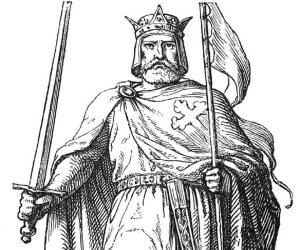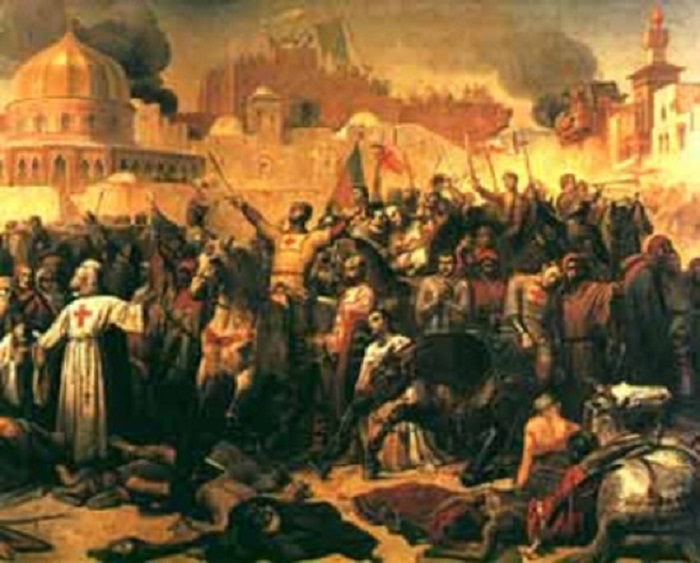By Dimitris Topalis,
The cause of the Second Crusade
Following the events of the First Crusade, four crusade states were formed; the Kingdom of Jerusalem, the Principality of Antioch, the County of Edessa, and the County of Tripoli. Out of those four, the County of Edessa was the weakest and the least populated. The reason was that it was the most northerly, which led to frequent attacks from the Muslim states. The events that followed certainly did not help after the death of Joscelin, the count of Edessa. His successor, Joscelin the Second, was forced to form an alliance with the Byzantine Empire, but in 1143 both the Byzantine emperor, John II Komnenos, and the king of Jerusalem, Fulk of Anjou, died. Joscelin also quarreled with the Count of Tripoli and the prince of Antioch, leaving the county of Edessa without any powerful allies. In late 1144, Joscelin II allied with the Ortoqids and marched out of Edessa with almost all of his army to support the Ortoqid army against Aleppo. That turned out to be one of the worst decisions made because Seljuk Zengi was rising in power and he wanted to take advantage of Fulk’s death.
Hence, after Joscelin’s march out of Edessa, he hurried to besiege Edessa, which fell to him after a month, on 24 December 1144. The news of the fall of Edessa reached Europe, so something had to be done. The plan for the Second Crusade was at first poorly received but soon enough Louis VII of France announced that he would be taking part in the expedition. The French King also considered an expedition independently from the Pope. The Second Crusade began in the year 1147, and its objective was to recapture the fallen city of Edessa.

The Byzantine empire during the Second Crusade and the tension with the West
During the Second Crusade (1147-1149), the emperor of the Byzantine Empire was Manuel I Komnnenos, who was very fond of the west and he favoured the Latin’s in Constantinople. Ever since the First Crusade, there were great suspicions between the West and the Byzantine empire. Manuel feared that the Crusaders were after some parts of his empire, especially because Jerusalem fell into their hands. That was the primary reason for him insisting that the leaders of the Second Crusade had to swear allegiance to him upon their arrival. The Western feudal believed that the Byzantine was too occupied with their affairs and unhelpful in the noble opportunities that the crusade presented. The tension between the Byzantine Empire and the West had risen between the years because the Byzantines were attacking the Crusader-held Antioch, and the crunches between the eastern and western churches continued. When the Crusaders arrived at the Byzantine capital, in 1147, things became worst. The crusaders discovered the Byzantine emperor Manuel had signed a truce with the Turks (because he saw them as a less of a threat than the Crusaders). The outrage from the French section of the army was such that they wanted to storm into Constantinople. The Crusaders were, eventually, persuaded to hurry on their way east, with reports of a large Muslim army preparing to block their path in Asia Minor. There, they ignored Manuel’s advice to stick to the safety of the coast and so they met their own disaster.
The disaster in Asia Minor
The German army, led by Conrad III, was the first one of the Crusaders to suffer for the lack of planning and not listening to Manuel’s advice. The Crusaders lacked food supplies and Conrad had underestimated the time needed to achieve his objective. At Dorylaion, a force of Seljuk Turk’s archers caused havoc on the Crusader army, forcing them into fleeing to Nicaea. Conrad himself was wounded during the attack but managed to return to Constantinople. Louis VII was shocked to hear about the defeat but he continued his operation and defeated a Seljuk Turk army, in December 1147, due to his superior cavalry. The Crusader army had become too stretched out, some units losing contact with each other and Seljuk’s army took full advantage. What remained of the westerners was commanded by a group of the Knights Templar. There were a few minor victories as the Crusaders made their way to the southern coast of Asia Minor, but it was a disastrous opening to a campaign, which had not even reached its target of northern Syria.

Τhe siege of Damascus
The Crusader army arrived in Damascus on December 1148 and immediately began a siege. After only four days, though, the difficulties presented by the defences and the serious lack of water for the attackers meant that the siege had to be abandoned. Once again, bad planning and poor logistics were to prove the Crusaders’ undoing. The fighting around the city had been ferocious, with heavy casualties on both sides but no real advance had been made. The failures of the Second Crusade were now putting the already legendary successes of the First Crusade into some perspective. There was to be no other fight, though, as Conrad III returned to Europe, in September 1148, and Louis, after a sightseeing tour of the Holy Land, did the same six months later. The Second Crusade, despite the initial high expectations, had disappointingly fizzled out like a water-damaged firework.
The Second Crusade aftermath
The Second Crusade left a huge blow in the Byzantine Empire, as it destroyed the carefully constructed diplomatic alliances of the empire. Also, it meant that Muslims would continue to attack the Byzantine Empire and would continue to be a threat to Christianity. As the Muslims slowly began to dominate the Byzantine Empire, at first they took Antioch, on 29 June 1149, then the county of Edessa was eliminated on 1150. Manuel would strike back with successful campaigns there, from 1158 to 1176, but the signs were ominous that the Muslims would pose a permanent threat to the Byzantines and Latin East.




